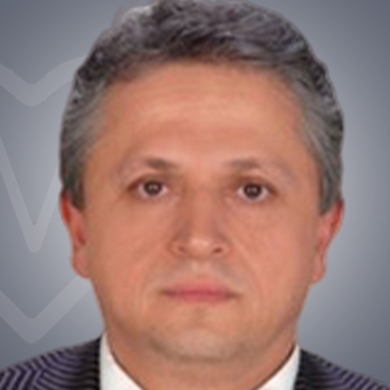
Medical Oncologist
Metropolitan Hospital , Pireas, Greeceof experience
Speaks: English
Dr.Stylianos is one of the reputed oncologists in Greece. He graduated from the medical school with honours and pursued his postgraduate training in internal medicine and surgery emergencies. He obtained his Certificate of Specialization in Medical Oncology from the University Oncology Clinic (PAGNI) in Heraklion, Crete.He finished his postgraduate education at the “Beatson Oncology Center’’, Glasgow, Scotland. He became the Chief of the 3rd Department of Oncology at IASO hospital, Greece in 2013. Later in 2016 he also became Chief of the 2nd Oncology Clinic of Iaso Hospital. Currently he is the Chief of both the Oncology Clinics. He completed his military service as doctor with the rank of Lieutenant. He was also associated with the 6th IKA Oncology Hospital as a medical oncologist.
Dr.Stylianos is a reputed oncologist with an eye for quality healthcare. He has an experience of nearly 20 years. He has published several articles in many international oncology journals. He is an active member of the medical community in Greece and has participated in several conferences and seminars. He is part of numerous associations such as HESMO (Hellenic Society of Medical Oncologists) ,ESMO (European Society for Medical Oncology) ,ASCO (American Society for Clinical Oncology) ,HORG (Hellenic Oncology Research Group).
A medical oncologist is trained to treat different types of cancer using chemotherapy and other medications, such as immunotherapy and targeted therapy. The medical oncologist designs a treatment plan after consultation with doctors from other disciplines. The doctor completely evaluates the nature of cancer and then treats cancer through various methods like chemotherapy, hormone therapy, and targeted therapy. Listed below are some of the conditions that Dr. Giassas Stylianos treats:
The earlier doctors detect cancer, the sooner the treatment can start. So it is vital to know the common types of cancer and some of their warning signs. There are more than 90 types of cancer, and some of them are more common than others. This depends on your gender, age, and racial or ethnic group. Some of the symptoms that cancer may cause are:
If you want to see Dr Giassas Stylianos, you can visit his clinic or associated hospital between 11 am and 5 pm from Monday to Saturday. Call the doctor or his attendant to confirm his/her availability because the doctor may not be available due to some personal reasons or any emergencies.
Some of the popular procedures that Dr Giassas Stylianos performs are:
Chemotherapy is a common procedure for the treatment of a certain type of cancer. It involves the use of chemicals to kill growing cancer cells in the body. Chemotherapy medications can be used alone or combined with other drugs to treat a variety of cancers. Hormone therapy is a procedure for cancer treatment that stops or slows the growth of cancer that mostly uses hormones to grow. It is also called hormonal therapy or endocrine therapy.

Share Your Experience about Dr. Giassas Stylianos

He has an experience of nearly 20 years as a medical oncologist.
He is a medical oncologist i,e he specializes in all types of cancer and its pathophysiology
Yes, Dr. Stylianos provides online consultation through MediGence.
Dr.Stylianos is part of numerous associations such as HESMO (Hellenic Society of Medical Oncologists) ,ESMO (European Society for Medical Oncology) ,ASCO (American Society for Clinical Oncology) ,HORG (Hellenic Oncology Research Group).
We can consult Dr.Stylianos when we need a second opinion for cancer diagnosis from a reputed and trusted oncologist.
He can be easily consulted by registering your profile with medigence and writing down your enquiry.A meeting with the surgeon will be scheduled. Following which the online consultation can be done.
A medical oncologist is a specialist who is trained to treat cancer using chemotherapy or other methods like immunotherapy or targeted therapy. The medical oncologist also consults with other doctors from different specialty areas to design the treatment plan. They also remain in touch with cancer patients to manage their symptoms and side effects post-treatment. If cancer cannot be treated, medical oncologists use hospice or palliative care for the patients. Medical oncologists are primarily responsible for managing cancer.
A medical oncologist would suggest the below tests to be performed to diagnose cancer:
A biopsy is an effective test to confirm cancer. It involves removal of tissues or a sample of cells from the body so that it could be studied in a laboratory. If you are experiencing some symptoms or if a doctor has found an area of concern, you might undergo a biopsy.
A person needs to see a medical oncologist when he/she is diagnosed with cancer. Medical oncologist can help understand diagnosis as well as plan cancer treatment. You can also see a medical oncologist for any questions you have. You need to see a medical oncologist if you experience the symptoms listed below: